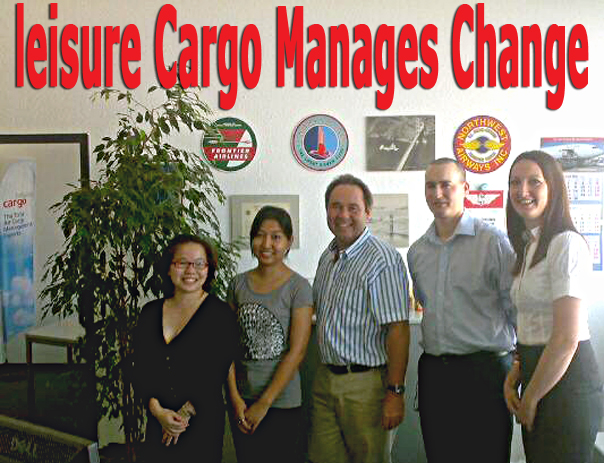leisure Cargo Looks Back At 2011
 Wide
world of leisure Cargo as east meets west. Wide
world of leisure Cargo as east meets west.
leisure cargo office is always
a meeting point for friends and colleagues around the world
visiting DUS—whether on business or at ‘leisure,’
everybody likes to come to say hello.
Mark Andrew (Managing Director)
and Sarah Nash (Sales Manager) from Airbridge International
UK Ltd. recently caught up with our colleagues from BKK who
were at DUS training in Revenue Accounting/Accounts Payable
Department
Mark and Sarah followed up some
items targeting cargo sales increase on leisure cargo’s
new focused carrier, Thomson Airways ex UK.
From left: Pattarawan Yansakylsaree
(Cook) and Arunrung Sapkaew (Pui) from leisure cargo BKK, Ralf
Ausländer, Mark Andrew and Sarah Nash
|
 Ralf
Ausländer, managing director of leisure Cargo GmbH, a Düsseldorf
company he created for LTU and continues to lead for Air Berlin that
provides Total Cargo Management (TCM) services, has had what he deems
an interesting and eventful year. Ralf
Ausländer, managing director of leisure Cargo GmbH, a Düsseldorf
company he created for LTU and continues to lead for Air Berlin that
provides Total Cargo Management (TCM) services, has had what he deems
an interesting and eventful year.
By now it is no secret that leisure handles
direct management of worldwide cargo handling contracts, road feeder
services, cargo revenue accounting, interline relations, claims processing
and settlement as well as supply of management information data for
19 carriers.
What is perhaps even more interesting
is that through financial crises and rebounds, mergers and acquisitions,
and even the complex assimilation of expanded duties with new carriers
into the leisure fold, Mr. Ausländer
has remained level, soft spoken and accessible while navigating through
it all.
Today, nearly a dozen years after he began
leisure Cargo, Mr. Ausländer continues piloting the company to
consistent growth and profits, although to hear him tell it, he had
hoped to do better in 2011.
“We thought coming out of 2010 that
this year would be another banner year with increases of maybe ten-plus
percent year on year, but now we realize that our performance figures
will settle at about seven and a half percent above 2010, which is,
I suppose, suitable considering the business climate and the financial
crises going on right now in Europe.
“Looking ahead to 2012, the outlook
is a bit difficult to predict.
“leisure Cargo has experienced an
enormous expansion of capacity in 2011 while phasing in the carriers
of the TUI Group.”
It should be mentioned that TUI, in addition
to serving its traditional markets via 143 aircraft and about 30 million
passengers yearly, is also developing emerging markets by growing a
portfolio of travel businesses, focusing on Russia and CIS, Brazil,
India and China.
TUI Travel is the first international
tour operator to build a presence in Russia and CIS, which also means
the leisure Cargo brand is spreading its wings and integrating a plethora
of new destinations as well.
“TUI Group is working very well
all around.
“In fact, for the first time in
the history of leisure Cargo, we will achieve the 100,000-ton mark by
the end of 2011, and, maybe even better, our revenue will increase to
100 million-plus Euros.
“So I would say that management
is looking at a good year in 2011—so far, so good.
“But realistically, looking at 2012
without the aid of a crystal ball in front of me, we can only do our
best amidst what has become an ever-changing situation.
“Let’s see what happens.
“In terms of growth markets, we
look at Florida alone for 20 weekly frequencies in our winter schedules
and 28 per week during the summer, so our connections there and into
Latin America are quite important to us.
“Carriers such as Air Berlin are
sure to beef up frequencies into Miami and elsewhere, including JFK
New York in 2012, when during Summer 2012 services will go double daily
into Dusseldorf and the same into Berlin.
“What that added capacity means
is further opportunities for us to extend the leisure Cargo offering.
“Our Air Berlin services during
Summer 2012 will go into Europe’s newest airport and the big Air
Berlin hub operation at Berlin Brandenburg International which, given
the capabilities of the new gateway and market conditions including
the current climate of night flight bans in Frankfurt, will be a welcome
addition for both passengers and air cargo trying to reach European
markets and beyond via leisure Cargo.
“We are also looking at other carriers
in the leisure Cargo family, such as ArkeFly (a Dutch charter airline
headquartered in Schiphol-Rijk) to commence direct services from Europe
to Las Vegas, Los Angeles and San Francisco in 2012.
“Speaking of serving the Americas,
in 2012 another member of leisure Cargo, Condor, will add summer services
to fly even more frequently from Europe to North America, including
Baltimore, Toronto, Mauritius and the Caribbean.
“In the Americas, Condor also serves
Cancun, Havana and Holguin in Cuba, Santo Domingo as well as Jamaica
and Panama.
“We are putting dots on the map
in North and Central America, where leisure Cargo will have more happy
landings.”
In terms of product mix, Ralf Ausländer
concedes that while he expects business as usual to continue, he knows
that change will be in the new volumes of cargo moved.
“Perishables has always been a substantial
part of our business in the Americas, especially in Florida, and that
will not change.
“Our consignments differ in each
gateway we serve, including in New York and Los Angeles, but we expect
to remain fairly consistent—with the caveat of greater volume.”
It’s worth noting that leisure Cargo
specializes in turnkey cargo sales and service concepts as well as exclusive
and truly 100 percent cargo management services.
Now as it begins its 12th year in business
in 2012, this total air cargo management company continues on its unique
mission of providing all carriers represented with full logistical know-how,
including sales, handling and road feeder service supported by a well
positioned GSA network worldwide.
Established in January 2000, leisure Cargo
is the only “virtual cargo airline,” meaning it does not
operate its own fleet but rather has complete access to the bellies
of 19 carriers. The leisure Cargo network today includes about 300 destinations.
By utilizing just one AWB and having access
to one reservation system worldwide “leisure Cargo shippers can
access and take advantage of a complete range of services with individual
attention to detail and satisfaction guaranteed,” Ralf Ausländer
assures.
Geoffrey/Flossie
|



